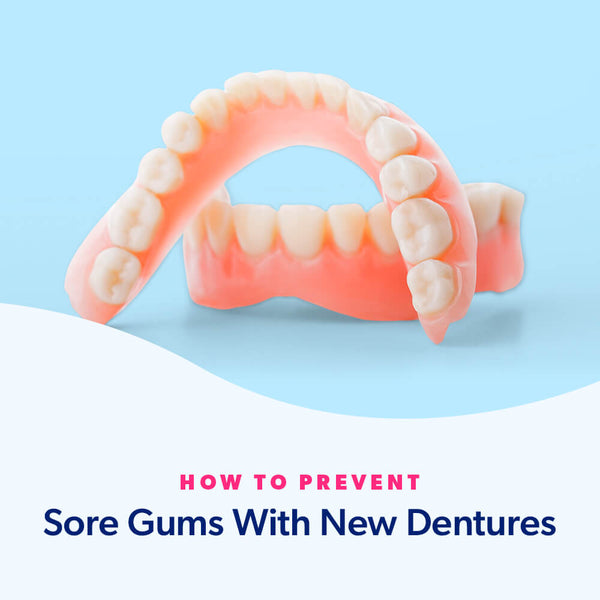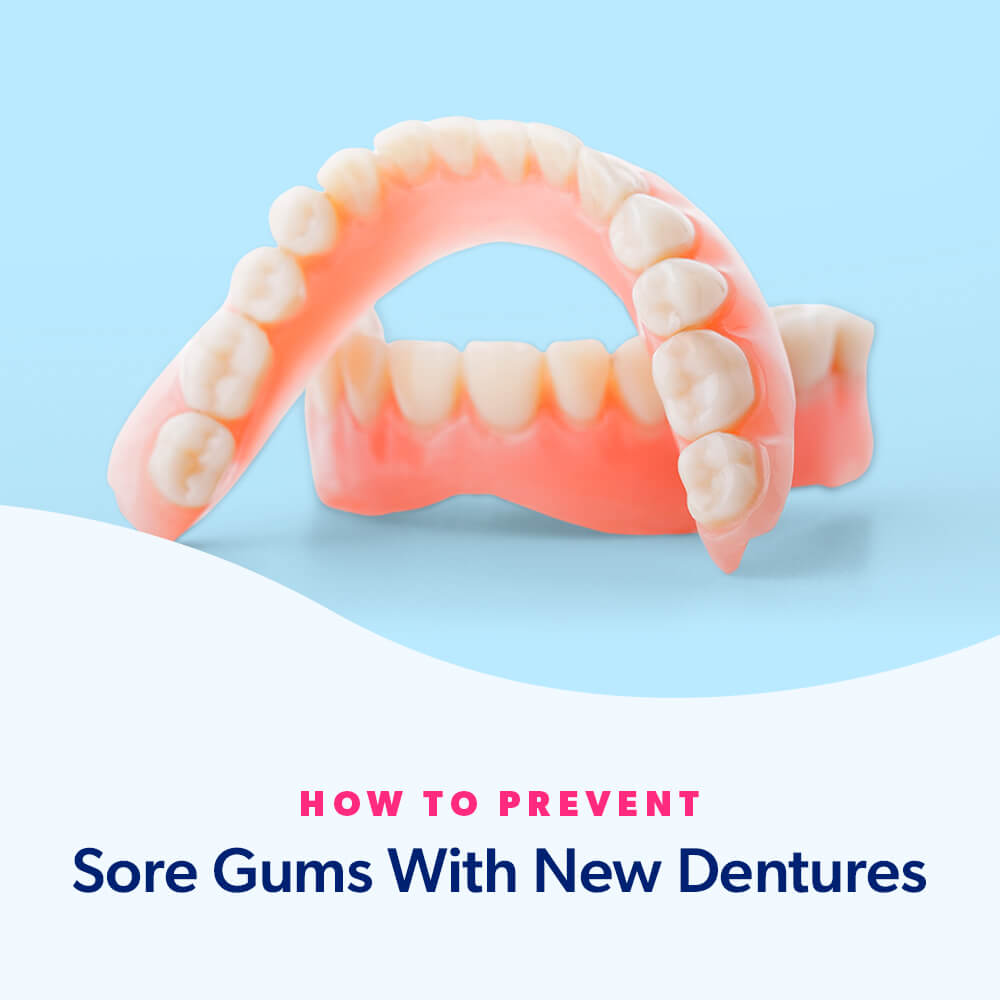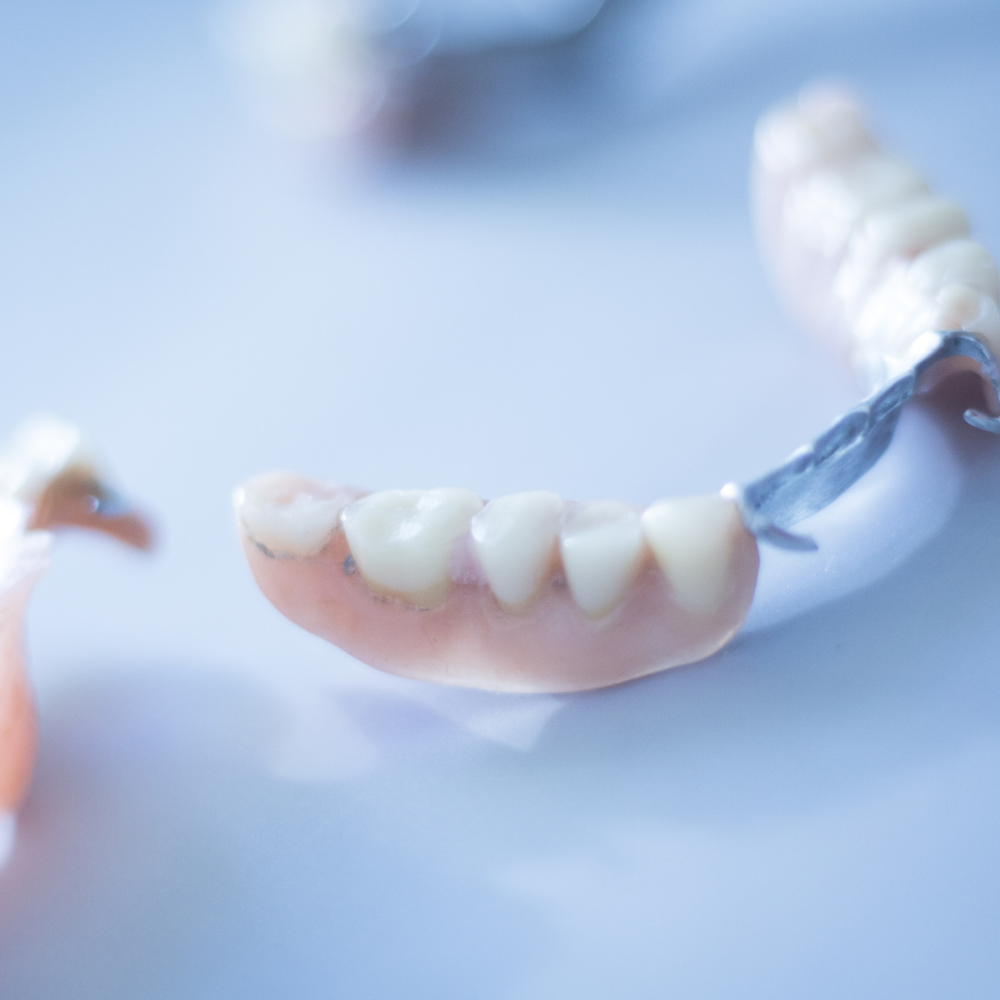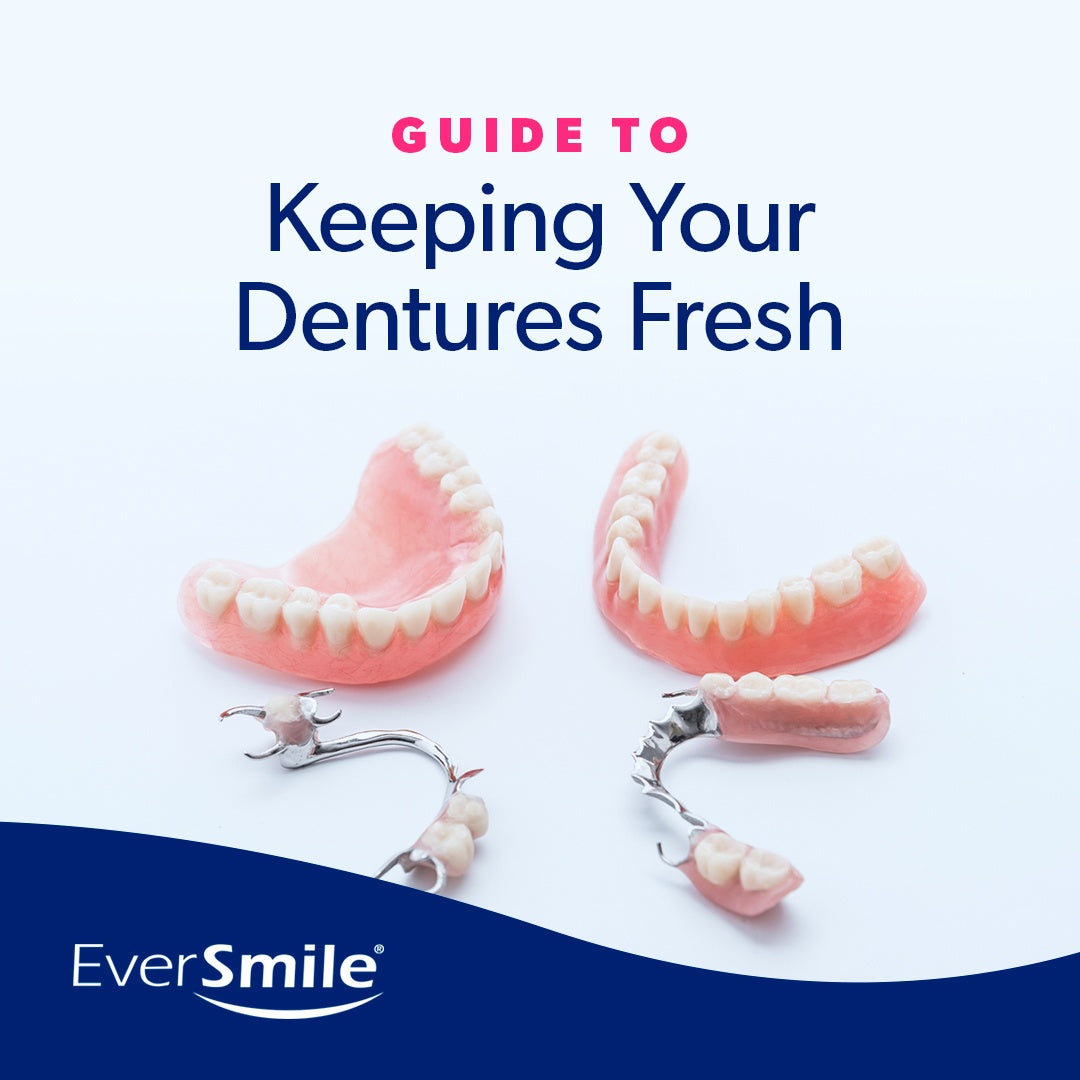
How to Prevent Sore Gums With New Dentures
Dentures are the answer to many dental ailments for people around the world. People of all ages use dentures to increase their quality of life by allowing them to eat their favorite foods and feel confident in their smiles every day. Whether you are new to partial or full dentures, you could be going through a bit of a learning curve. Experiencing gum discomfort is often a part of the process of growing accustomed to your new dentures.
New denture sores are uncomfortable, but the good news is you can treat them and even prevent them from occurring in the future. Below, we'll take a closer look at why new dentures hurt and what can help your sore gums when wearing new dentures. With the right practices and a little patience, you can experience the joys that dentures can add to your life.
What Causes Sore Gums Under Dentures?
It's hard to ignore the discomfort caused by sore gums from your dentures, but understanding why your gums are hurting is a different matter. Knowing the reason behind your sore gums is the first step in easing the pain and preventing it from happening again. Here are five reasons why you could be experiencing sore gums under your dentures:
1. An Improper Fit
Having a proper fit for your dentures is one of the essential parts of having a comfortable experience. When you first start the process of getting dentures, your dentist will make sure your dentures sit comfortably in your mouth. Even with the right fit, it's normal to go through a period of a few weeks where your gums are tender. But after this adjustment period, the pain in your gums should subside if your dentures fit well.
If the gums under your top or bottom dentures hurt, chances are high something is wrong with the fit. Poor-fitting dentures tend to move around or apply extra pressure on some areas of your mouth, leading to sore gums and other issues. Dentures cutting into your gums can be an unpleasant result of an improper fit. Consult your dentist if your gum pain continues after the adjustment period or gets worse, as you may need to have your dentures adjusted to fit properly.
2. Trapped Food Particles
A common cause for sore gums from dentures is food particles getting stuck between your dentures and your gums. Good-fitting dentures go a long way in preventing this from happening. But it's still possible for food to make its way between your dentures and your gums even if your dentures have a good fit.
When eating food, your dentures can shift slightly, allowing food particles to get stuck. The added pressure from trapped food particles can cause pain to your gums in those areas. And if left uncleaned, these particles can create a buildup of bacteria and plaque, which can lead to more pain and other issues you'll want to avoid.
3. Bacteria
As we mentioned above, bacteria is one of the main culprits for sore gums when wearing new dentures. Bacteria clings to food particles on your dentures, and as it mixes with starches from the food you eat, it can develop into plaque. Left unchecked, plaque can develop further and turn into tartar.
Tartar is hard, visible, calcified plaque. As it grows in size, it can start to add pressure to your gums, creating sore spots. This buildup can also get into any wounds in your gums, leading to painful infections. Make sure you're taking precautions to avoid the buildup of bacteria, plaque and tartar.
4. Thrush
Thrush, also called "denture stomatitis," is a condition in the mouth caused by a yeast or fungus known as candida. Everyone's mouth contains a small amount of candida, but it can cause pain in your mouth if it grows to a high level. Wearing dentures can increase your risk of thrush, making it a common cause of gum soreness.
Thrush appears as white sores in the mouth, and they can make the process of wearing dentures more painful than it should be. This condition can also lead to dentures fitting poorly in the future, which can cause even more gum pain. Make sure you do what you can to prevent thrush from getting out of hand so you can experience less gum pain as you settle into your new dentures.

5. Hard, Crunchy or Spicy Foods
One of the main goals of wearing dentures is to be able to eat your favorite foods again. After getting new dentures, you'll have to go through a period where you "relearn" how to eat with your new teeth. In several weeks, you should be able to eat without much of an issue. Yet, there are some foods you should avoid, at least during this learning period.
Hard, crunchy foods can be difficult to chew when wearing your new dentures. As you chew them, they will force your dentures to press against your sensitive gums, leading to discomfort. Spicy and vinegary foods can also lead to gum pain if you have any cuts or sores in your gums from ill-fitting dentures.
How Sore Gums Can Affect Your Denture Experience
You chose to get dentures so you can enhance your quality of life, but sore gums can take a toll on your experience every day. Here are some of the ways sore gums can affect how you live your life with dentures:
Daily Discomfort
Dentures, when properly cleaned and fitted, can improve your quality of life in many ways. You can enjoy eating all your favorite foods and speak with greater articulation. Dentures can also help you regain your confidence in your smile, making you feel better about yourself in public settings. But when dentures have an incorrect fit or accumulate bacteria or plaque, they can lead to sore gums. Then, you'll be wanting to spend less time wearing your dentures, which is the opposite effect they should have.
Without the right cleaning techniques or a proper fit, sore gums from your dentures can cause daily discomfort that can affect how you live your life. Having sore gums from dentures is the beginning of other issues that negatively affect your experience with your dental appliance.

Difficulty Speaking
Sore gums and a poor fit can affect your speaking ability as you settle into your new dentures. You might experience a period when your speech sounds different after getting dentures. But within a few weeks of practice, your speech should return to normal and feel more natural. In fact, dentures can even help you speak better than you did before you wore them. Sore gums can get in the way of this progress, making speech more difficult than it should be with dentures.
If your dentures lack a proper fit and are pressing against your sore gums, talking can be an uncomfortable experience. It could affect how you pronounce your words or even how much you choose to talk as you try to limit the pain. You might even decide to leave your dentures out rather than aggravate your sore gums as you speak. If you find you're having difficulty speaking for several weeks after receiving your new dentures, you should contact your dentist right away to find a solution.
Trouble Eating
You could have trouble eating when you experience gum pain while wearing dentures. You might have gotten dentures to enjoy your favorite foods again, but when your dentures cause your gums to become sore, the opposite could be true. You may be able to eat certain foods again, but the discomfort could make the experience much less enjoyable.
As you eat certain foods — especially crunchy foods — you'll apply pressure to your dentures, causing them to press into your sore gums. And if your dentures lack a proper fit, then food particles can get trapped between your gums and dentures, leading to other issues that could cause even more pain. Preventing sore gums from the beginning can help you have a much better experience when eating after getting your new dentures.
Preventing Sore Gums From Dentures: How Can I Make My Dentures More Comfortable?
Now that you know why people experience gum pain, it's time to learn what steps you can take to prevent sore gums from happening or continuing as you wear your new dentures. With the right practices, you can limit your discomfort to your adjustment period so you can enjoy your dentures for months and even years to come. Here are some of the best steps you can take to make your dentures more comfortable:
![Practice Proper Dental Hygiene [steps]](https://cdn.shopify.com/s/files/1/0662/0303/files/05-Practice-proper-denture-hygiene-pinterest.jpg?v=1624972397)
1. Practice Proper Denture Hygiene
Proper denture hygiene may add a few minutes to your daily routine, but all your time and effort will be worth it when you experience less gum pain as a result. Follow these steps to help keep your dentures clean:
- Use EverSmile's FreshDent: FreshDent by EverSmile is the solution for every denture wearer around the world. Keeping dentures clean can be a process, but you'll have an easier time caring for yours when you use FreshDent. FreshDent is a pocket-sized denture cleaner that cleans your dentures as you wear them. The hydrogen peroxide solution kills bacteria on your dentures, keeping them cleaner and safer while helping prevent sores from forming on your gums from plaque or tartar. And FreshDent smells great, helping you feel confident in your dentures.
- Clean areas of your mouth covered by dentures: Areas covered by your dentures when you wear them are more susceptible to bacterial buildup and sores. These spots include your gums and the roof of your mouth. Take time to clean these areas with doctor-recommended toothpaste and mouthwash to experience a cleaner mouth and less of a chance of gum and mouth sores from your dentures. Having a cleaner mouth will help keep your dentures cleaner, too.
- Remove and soak your dentures overnight: You should always remove your dentures and immerse them in water or a soaking solution before bed. This practice will loosen particles on your dentures, making them easier to brush away when you wake up. Removing your dentures before bed also spares them from accumulating bacteria that form in the mouth as you sleep. Make this task part of your daily routine to take another step toward a healthier mouth and fewer sores.
- Use your dentures regularly: When it comes to having good hygiene with your dentures, consistency is key. Your dentures need to settle into your gums for a proper fit, which will help your mouth stay cleaner and resist sores. If you wear your dentures sporadically, you may start experiencing more gum pain. Leaving your dentures out in the open can also allow them to harbor airborne bacteria, leading to health concerns. Wear and clean your dentures on a regular basis for a healthier and more comfortable experience.

2. Eat Softer Foods
Remember that crunchy and hard foods can lead to sore gums and a painful eating experience when starting out with new dentures. You can help relieve sore gums and prevent soreness from occurring by eating softer foods as you grow familiar with your new dentures.
Soft fruits and vegetables, ground meat, pudding and various soups are a few options you can try when learning how to eat with your new dentures. You'll have an easier time eating these foods while putting less pressure and force on your sensitive gums. Before long, you'll be able to eat many of the other foods you know and love that have a firmer texture.

3. Relax Your Gums
Sore, inflamed gums begin to swell, leading to high levels of sensitivity when wearing your dentures. When this occurs, take a break from your dentures — remembering to submerge them in water or a soaking solution — and spend some time relaxing your gums. Here are a few ways you can do this:
- Reduce plaque and tartar: Plaque and tartar can cause your gumline to grow inflamed, leading to more discomfort and swelling. Follow a proper denture hygiene routine to reduce plaque and tartar, which will help provide some relief for your swollen gums and prevent further discomfort.
- Massage your gums: After washing your hands, use your fingers to gently rub your swollen gums. This action can provide some relief from your pain, but it can also improve blood flow in your gums to bring the swelling down.
- Use a hot compress: Hot compresses can also help stimulate blood flow to reduce your swelling and help your gums relax. When you first get your dentures, you should use hot compresses to help make the adjustment period more tolerable. Soak a clean cloth in hot but not boiling or scalding water, wring out the excess and hold it against your cheek or mouth. Apply the compress outside where you're experiencing gum swelling or soreness.
- Rinse your mouth with salt water: Salt water can inhibit bacteria while reducing more sores, pain and gum swelling. If your gums are swelling and hurting, try mixing some salt in lukewarm water and swishing it around your mouth to reduce these ailments.
4. Take Over-the-Counter Pain Medications
Another way to deal with gum pain from your dentures is to use over-the-counter pain medication. There are several options to choose from, so talk with your dentist and your doctor about which is right for you. You want to relieve your gum pain, but you should make sure the pain medication you use will be safe to use with your current medications and preexisting health conditions.
Over-the-counter pain medications can make the beginning adjustment period of wearing dentures much more tolerable. But you can also keep these medications on hand in case the pain lingers or returns.
5. Try Herbal Inflammation Remedies
Some herbs contain active ingredients that can help prevent and manage soreness of gums from your dentures. Try the following herbal remedies to experience relief without using painkillers:
- Aloe vera gel: Aloe vera made for oral use is one of the best remedies for managing denture pain. Its soothing effect can help calm your swollen gums. Try applying a small amount the next time you massage your gums during a period of discomfort to experience its naturally soothing and antibacterial qualities.
- Turmeric: Cultures around the world have long used turmeric for its anti-inflammatory properties. Turmeric's active ingredient, curcumin, contains many antioxidants and can help reduce gum swelling from dentures.
- Black tea: Black tea contains tannins, which can fight harmful bacteria and soothe gum swelling. Drink it hot to enjoy the sensation of warm liquid against your swollen gums, which can help stimulate blood flow. Be sure to rinse after drinking tea, as it can cause a dry mouth, resulting in a higher chance of plaque and tartar on your dentures.
- Cloves: Cloves contain a component called eugenol, which possesses important antioxidants as well as some anti-inflammatory effects. Try adding ground cloves to your diet to experience the benefits they can provide for your swollen gums.
6. Make Sure Your Dentures Have the Correct Fit
Having a proper fit is one of the most crucial aspects of wearing dentures. A loose fit can lead to cuts, sores and swollen gums, but a properly fitting set of dentures will feel comfortable and allow you to experience a better quality of life. If you're experiencing gum pain or feel like certain areas of your mouth hurt more than others, your dentures may need an adjustment. Contact your dentist right away to make sure your dental appliances have the best fit possible.
7. Use a Denture Adhesive
Even dentures with the proper fit can shift in your mouth on occasion. Slipping dentures can be uncomfortable, but they also open up the possibility of food particles getting between your dentures and your gums when you eat. Remember that buildup can make gum pain worse, as these particles foster inflammatory plaque and tartar.
A denture adhesive can help your dentures stay put to reduce these issues. When you use a denture adhesive, your dentures will have an easier time staying in place while blocking food particles from getting beneath your dentures. You can then prevent gum soreness caused by shifting dentures and food particles. The adhesive itself can also provide some relief for sore gums, as it usually comes as a protective gel that provides an extra layer of comfort against rubbing and pressure from your dentures.
Purchase FreshDent From EverSmile to Enhance Your Denture Hygiene
As you grow familiar with your new dentures, you should do everything you can to reduce your pain and discomfort. FreshDent from EverSmile can help you achieve improved hygiene with your dentures while fighting bacteria to give you a fresher and more confident smile. You can also shop our full line of products to find more ways to enhance your oral hygiene and work toward a healthier, more radiant smile.
Contact us online today for more information about how our products can help reduce and prevent gum discomfort from wearing dentures. Make sure to stay up-to-date with our blog for the latest tips, tricks and resources for oral hygiene. We look forward to helping you achieve a more confident smile!
Related Articles
-

How to Prevent Sore Gums With New Dentures
Dentures are the answer to many dental ailments for people around the world. People of all ages use dentures to increase their quality of life by allowing them to eat their favorite foods and feel confident in their smiles every day. Whether you are new...
Read More -

Top Reasons You Shouldn't Sleep With Dentures
Perhaps it's been a long day, and you're tired. Or, maybe you don't like to be without teeth. What's the harm in leaving your dentures in overnight? There's a reason your dentist recommends removing your dentures for at least five to six hours per day and...
Read More -

Are My Dentures Causing Bad Breath?
Dentures can change your life. They're important to your ability to chew, and they give you a killer smile. The only downside? They might cause bad breath. Both permanent and removable dentures are notorious for their ability to cause denture breath, but we can help...
Read More -

How to Clean and Care for Partial Dentures
When you think of dentures, you might have visions of your grandma's full set soaking in a glass on her nightstand. But dentures aren't just for the old and toothless. Tooth loss can happen for a lot of reasons to people of all ages, and...
Read More -

14 Tips for a Healthier Smile
A smile is often one of the first things people notice about us, and many people take great pride in having an attractive smile. However, the importance of having a healthy smile goes beyond mere appearances. The health of our teeth and gums is directly tied...
Read More -

Guide to Keeping Your Dentures Fresh
If you're one of over 40 million people in America who wears dentures, you probably wonder how you can keep your dentures fresh and clean. From the right methods to the best cleaners, there's a lot to consider. But with proper denture care, you'll keep...
Read More









Post a Comment!